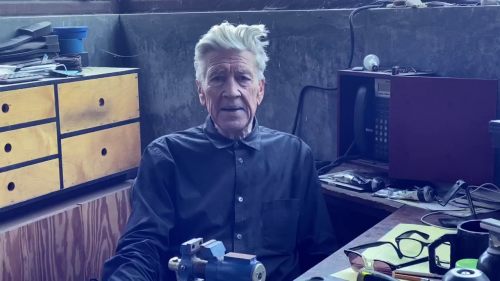TWIN PEAKS: THE RETURN Is The Best Film Of 2017
If you even casually peruse Film Twitter - which is what I'd suggest, should you wish to live and see Thursday - you've probably noticed that only one debate has overtaken the rather raucous social media group: is Twin Peaks: The Return a film, or is it television? It's a discussion this writer's been engaging in since David Lynch and Mark Frost's landmark work first aired, wondering aloud if its rather recognizable visual grammar and initial conception as an un-segmented work marked it for filmic qualification, despite its final serialized format:
"...on the surface [Twin Peaks: The Return] doesn’t seem to fit into this conversation. But once you do a little digging into the road David Lynch and Mark Frost took in getting their eighteen-hour absurd epic to living rooms across the country, the line between mediums becomes just as blurry. For starters, the original script was reportedly written as one four hundred-plus page document, that was then shot and segmented into hours. There was no “series bible” or individual teleplays. The Return was written as a single intimidating tome, that Mark Frost has even jokingly compared to the Manhattan Phone Book. When asked how they’d prefer reviewers approach the unwieldly tale, the two mad geniuses requested that each hour not be referred to as “Episodes”, but rather “Parts”. While this might seem like pretentious semantics, it recalls Lynch’s past distaste for newfangled forms of viewing (his anti-cell phone viewing screed is still a classic of the genre) and the lack of chapters on the original Mulholland Drive DVD. The Return may be longer than Berlin Alexanderplatz, but it’s still meant to be viewed as a whole, and on screens larger than the one that fits in your pocket."
Recently, the argument's been dredged up again, because both Sight & Sound and Cahiers du Cinéma included the eighteen-part magnum opus on both of their Best of '17 Film lists. Here's Sight & Sound's:
1. Get Out, dir: Jordan Peele
2. Twin Peaks: The Return, dir: David Lynch
3. Call Me by Your Name, dir: Luca Guadagnino
4. Zama, dir: Lucrecia Martel
5. Western, dir: Valeska Grisebach
6. Faces Places, dir: Agnes Varda, JR
7. Good Time, dirs: Ben and Josh Safdie
8. Loveless, dir: Andrey Zvyagintsev
9. Dunkirk, dir: Christopher Nolan
9. The Florida Project, dir: Sean Baker
11. A Ghost Story, dir: David Lowery
12. BPM, dir: Robin Campillo
12. Lady Macbeth, dir: William Oldroyd
12. You Were Never Really Here, dir: Lynne Ramsay
15. God’s Own Country, dir: Francis Lee
16. Personal Shopper, dir: Olivier Assayas
16. The Shape Of Water, dir: Guillermo del Toro
16. Strong Island, dir: Yance Ford
19. I Am Not Your Negro, dir: Raoul Peck
19. Lady Bird, dir: Greta Gerwig
19. Let the Sunshine In, dir: Claire Denis
19. Moonlight, dir: Barry Jenkins
19. mother!, dir: Darren Aronofsky
19. Mudbound, dir: Dee Rees
25. The Other Side Of Hope, dir: Aki Kaurismaki
25. Silence, dir: Martin Scorsese
And now here's Cahiers du Cinéma's:
1. Twin Peaks: The Return (David Lynch)
2. Jeannette: The Childhood of Joan of Arc (Bruno Dumont)
3. Certain Women (Kelly Reichardt)
4. Get Out (Jordan Peele)
5. The Day After (Hong Sang-soo)
6. Lover For a Day (Philippe Garrel)
7. Good Time (Josh and Benny Safdie)
8. Split (M. Night Shyamalan)
9. Jackie (Pablo Larraín)
10. Billy Lynn’s Long Halftime Walk (Ang Lee)
Landing #1 on Cahiers and #2 on Sight & Sound suddenly gives those who've made this case some sense of credence, as now two of the most respected film publications in the world are essentially thinking outside the format box, allowing our ever-evolving platforms for cinematic consumption to not get in the way of how we view works of cinema. Yet some folks still aren't buying this line of bullshit, and Vadim Rizov at Filmmaker Magazine breaks down that take:
Yes, Twin Peaks is TV.
- It literally aired as television, in time-honored fashion: a two-hour premiere, a two-hour finale, with episodes generally spaced apart one week of broadcast at a time, each with an opening and closing credits sequence.
- As Matt Zoller Seitz pointed out in a long thread about why this is definitely TV, for maximum coherence season three is dependent upon knowledge of the first two seasons of the show and Fire Walk With Me; it is literally unimaginable without these building blocks, the first of which are definitely TV (serial, linear, one week at a time, multiple directors and writers, showrunner).
- Mark Frost does not get enough credit for being tasked with creating a mythology that could sustain everything Lynch wanted to jam into it.
But Rizov also offers a counter to the mindset that spawns the rejection of The Return's reclamation as cinema, peering into the mind of an angry TV critic for a second:
Yes, Twin Peaks is a movie.
I’m interested in the aggrievement within pushback from TV critics on this particular point. I see people complaining that calling The Return a movie was “denigrating” to the medium of television and visualize a sentient, sensitive child entering its teens that would be hurt not to be recognized for the very special kid it is rather than a little-loved younger sibling. I imagine grave-faced meetings of the Sight & Sound editorial team and BFI’s board of directors, with austere representatives emerging later at press conferences: “We’re so sorry … we are reexamining our internal culture … we did not mean to cause offense to the television community.” Seitz (friendly acquaintance, at least as of this writing) again: “Why is scripted, serialized TV not respected as its own art form, with its own distinct characteristics & challenges?” Emily Nussbaum, who’s won a Pulitzer for her TV criticism, tweeted, “If the film people are going to list Twin Peaks, we get to take back some movies. I’m going to grab five random movies and call them an anthology series and you can’t stop me.”
The idea that “scripted, serialized TV” is “not respected as its own art form” in 2017 is not congruent with my reality; the last decade of writing on pop culture sites has been dedicated to the idea that “TV is the new movies,” the place where artists go to express themselves in more interesting and expansive ways than the increasingly irrelevant movies — a trope now taken as a truism. TV critics are no longer tasked with reviewing endless disease-of-the week TV series or crummy event mini-series; they’re arbiters of The Dominant Medium of Our Time, which wasn’t true 20 years ago but definitely is now. (The hot take would now be against TV; who will be our Newton Minow?) Nussbaum’s tweet speaks to a different, equally inexplicable anxiety: that The Film People (those child-snatchers!) will try to Take Twin Peaks Away From TV. That’s a non-starter: it’s on numerous best TV of 2017 lists already, including that of Rolling Stone‘s Rob Sheffield, who ranks it at number one and knows what’s up: “Cheers to Showtime for trusting Lynch, along with co-creator Mark Frost, to pull off all 18 hours. Nothing like Twin Peaks: The Return has ever happened before or will again.”
The split of opinions on this topic is fascinating (not to mention a relief, as this ingenious work of art should be dominating the conversation), mostly because they both essentially come from a position of recognizing Twin Peaks' importance in the expansion of each medium. With the popularization of Netflix and other streaming services - allowing longform, contained stories such as Godless to exist in an eight-hour format - we're getting a glimpse at how artists are exploiting new forms of consumption to their advantage. The Return is a monument because it sees one of our greatest directors cobbling together an eighteen-hour collection of his best, worst, and most bizarre impulses, often operating like a grand experiment, wherein he could finally exorcise certain creative notions, once and for all.
On the other hand, there's the faulty logic that The Return is suddenly going to open these doors for other artists to do exactly the same, which (as Rizov also notes) seems to come from a displacement of supreme idealism. The reason Twin Peaks exists at all is because Intellectual Property is all the rage, and Lynch simply took the opportunity to play hardball with Showtime, making demands that would allow his artistic freedom to run wild. Yet had it not been connected to a recognizable "brand", the network would've told Lynch and Frost to go fuck themselves. Nobody's going to shell out the money they did for an eighteen-hour art film, regardless of the pedigree. That's just the nature of the business, modern or otherwise.
Yet this fact remains: The Return is special. From Kyle MacLachlan's incredible performance, to that haunting final hour (which left everyone pondering its meaning for months afterward), the Twin Peaks revival was a creative triumph on a level no one could've predicted. Regardless of how you classify the work, it's a stand out piece of a filmography already brimming with masterpieces, perhaps acting as the capstone to Lynch's entire output. Enthusiasts of either medium should recognize this while engaging in playful (or perhaps not so playful) bickering over the nature of the beast itself.
Because, in the end, it really doesn't matter whether you include The Return on your Best Of list or not. This is the Internet, Jack. There's a high probability someone's gonna disagree with you, either way.



